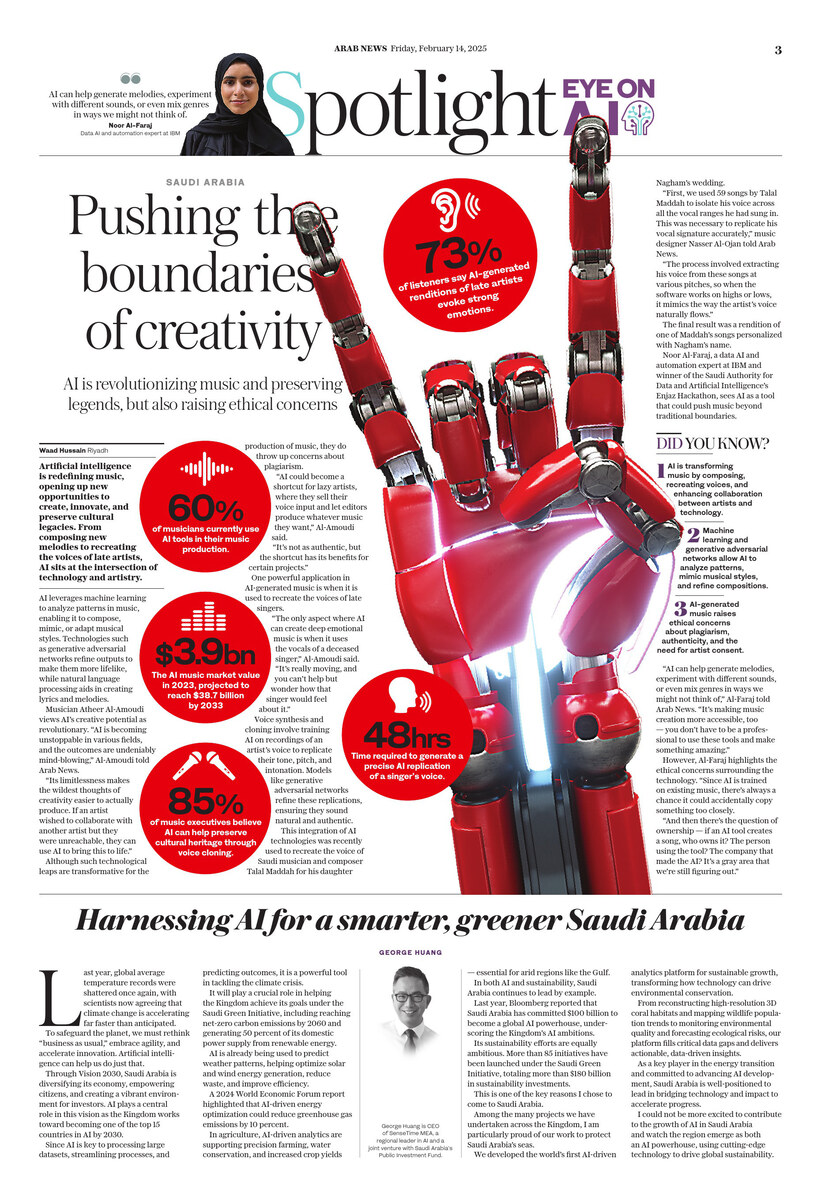Harnessing AI for a smarter, greener Saudi Arabia

https://arab.news/b9ah7
Last year, global average temperature records were shattered once again, with scientists now agreeing that climate change is accelerating far faster than anticipated.
The devastating wildfires in Los Angeles served as a stark reminder that sustainability is no longer a choice, but a necessity.
To safeguard the planet, we must rethink “business as usual,” embrace agility, and accelerate innovation. Artificial intelligence can help us do just that.
Living in Saudi Arabia, after time spent in East Asia, North America, and South America, I continue to witness the transformative power of bold visions.
Through Vision 2030, launched in 2016, Saudi Arabia is diversifying its economy, empowering citizens, and creating a vibrant environment for investors. AI plays a central role in this vision as the Kingdom works toward becoming one of the top 15 countries in AI by 2030.
Since AI is key to processing large datasets, streamlining processes, and predicting outcomes, it is a powerful tool in tackling the climate crisis.
It will play a crucial role in helping the Kingdom achieve its goals under the Saudi Green Initiative, including reaching net-zero carbon emissions by 2060 and generating 50 percent of its domestic power supply from renewable energy.
AI is already being used to predict weather patterns, helping optimize solar and wind energy generation, reduce waste, and improve efficiency.
A 2024 World Economic Forum report highlighted that AI-driven energy optimization could reduce greenhouse gas emissions by 10 percent.
In agriculture, AI-driven analytics are supporting precision farming, water conservation, and increased crop yields — essential for arid regions like the Gulf.
To turn our ambitious sustainability goals into reality, we must harness AI across all sectors and industries.
In both AI and sustainability, Saudi Arabia continues to lead by example.
As a key player in the energy transition and committed to advancing AI development, Saudi Arabia is well-positioned to lead in bridging technology and impact to accelerate progress.
George Huang
Late last year, Bloomberg reported that Saudi Arabia has committed $100 billion to become a global AI powerhouse, underscoring the Kingdom’s AI ambitions. Its sustainability efforts are equally ambitious.
More than 85 initiatives have been launched under the Saudi Green Initiative, totaling more than $180 billion in sustainability investments.
This is one of the key reasons I chose to come to Saudi Arabia — to contribute to its rapidly growing and environmentally conscious AI ecosystem.
Among the many projects we have undertaken across the Kingdom, I am particularly proud of our work to protect Saudi Arabia’s oceans.
We developed the world’s first AI-driven analytics platform for sustainable growth, transforming how technology can drive environmental conservation.
From reconstructing high-resolution 3D coral habitats and mapping wildlife population trends to monitoring environmental quality and forecasting ecological risks, our platform fills critical data gaps and delivers actionable, data-driven insights.
While AI does have its risks and challenges, there is a strong case for its inclusion in sustainability toolkits, complementing human-led efforts.
Foresighted stewardship, interdisciplinary collaboration, and regulatory compliance are key to unlocking AI’s full potential and ensuring it serves as a force for good.
Partnerships also play a crucial role in developing impactful AI applications. Our regional ocean initiatives are a testament to this, benefiting both marine life and local communities.
The recent WEF meeting in Davos strengthened ties between AI practitioners, scientists, and activists working toward a more sustainable future.
Even corporations, facing increasing environment, social, and governance requirements, stand to benefit from applying AI to address climate challenges.
We should aim for continued multilateralism, even in a time of growing global conflicts. Despite its flaws, Davos remains unparalleled in fostering dialogue among world leaders.
As a key player in the energy transition and committed to advancing AI development, Saudi Arabia is well-positioned to lead in bridging technology and impact to accelerate progress.
In doing so, it could inspire other countries and companies to follow suit, shifting the narrative from AI supremacy to AI collaboration in pursuit of a better tomorrow.
I could not be more excited to contribute to the growth of AI in Saudi Arabia and watch the region emerge as both an AI powerhouse and a key partner, using cutting-edge technology to drive global sustainability. Now is the time to work together to shape a smarter, greener future.
• George Huang is CEO of SenseTime MEA, a regional leader in AI and a joint venture with Saudi Arabia’s Public Investment Fund.


























